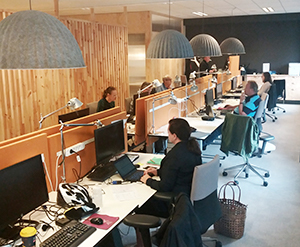Life improved with workhub

A workplace close to home for suburban residents who normally commute an hour to work each morning. Tullinge workhub is a research project that will investigate what happens when we cut down on everyday travelling.
Behind the library in Tullinge a KTH lab is disguised as an office space – the interior nicely designed. The office landscape has everything you could wish from a workplace: workstations with height-adjustable tables, kitchens, coffee machines, monitors, meeting rooms… But this is not a workplace in the usual sense. The members of Tullinge's workhub are all involved in a research project, a so-called Living Lab, which means an experiment in people's everyday lives. The participants come from different employers, but in common is a long way to their regular office, often 60-70 minutes – in one direction. But as members of the workhub the 62 participants can book an alternative workplace near home a couple of days a week.
The workhub in Tullinge is part of the research program Mistra Sams, focusing on future transportation - or as in this case: no transport at all.

”We want to see what happens when you minimize your travelling”, says Martin Sjöman, designer and doctoral student at KTH. ”Everyday travelling is expensive, both for society, the environment and the household economy. It also affects our everyday lives greatly”.
The members use the workhub free of charge, but in return they regularly answer questions and contribute with their “travel diary” and thus contribute to the research. And so far, the big win for the participants is improved everyday life during workhub days, according to Martin Sjöman:
”People are under a lot of pressure, it’s evident in the interviews we’ve done. Being able to attend a meeting at a daughter's school and easily get there by using one of the hub's electric bikes, being able to run half an hour before work, celebrating a child's birthday in the morning or catching up on things after work that you normally save for the weekend gives our participants more quality of life.”
The hub has three electric bicycles, the start of a bicycle pool service, and Martin’s team have plans for a carpool service. All desks and other services are booked in an app that also serves as a travel planner for public transport.
Martin Sjöman believes workhubs outside city can be an attractive alternative in a very near future. Companies would be able to cut down on the number of workplaces in the city and instead offer a few places in a suburb, with good savings. In suburbs that have many commuters, local workhubs can be a way to bring life to drowsy municipalities.

But there are still obstacles. Martin Sjöman says that it has been a little difficult to recruit companies for the project. Many are still stuck with policies or processes that require the employees’ presence on site.
”They express concern that the absence will interfere with the cooperation in projects, and some also refer to privacy and security aspects. We are planning a workshop with employers so that we together can find solutions to how to let employees work outside the office while maintaining quality at work”.
More and more so-called ”co-working spaces” are emerging in the city. Here, not only is a workplace offered, it’s also a place to socialize, where you are expected to expand your business network. At the same time, our normal offices are being rebuilt to be flexible and activity-based.
”The question is how efficient and flexible do we really want to be, or CAN be? Not everyone thrives in such organizations. At the workhub you are not networking, and you are not sitting beside your closest colleagues. Instead, our participants appreciate the calm and the concentration. It’s very quiet here”.
Text: Anna Gullers

